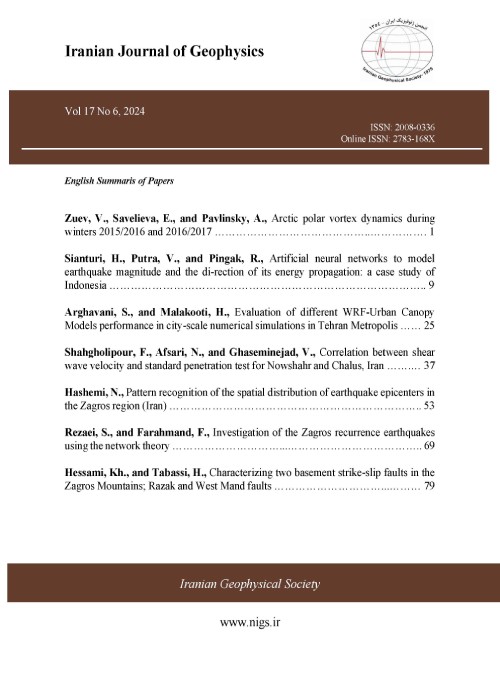Application of machine learning algorithms to estimate solar radiation (case study: arid and semi-arid climate)
Solar radiation is very important as one of the important variables in energy balance models and plant growth simulation. Although the measurement of this variable has a relatively long history in Iran, due to the high costs of measuring devices, there is no pyranometer in many existing stations in the country, and there are problems such as its recalibration, water, and dust accumulation that exists on the sensor. Even in meteorological stations that measure radiation, there are days when radiation data is not recorded or unrealistic values outside the expected range are observed due to equipment violations or other problems.This research investigated the performance of nine machine learning algorithms including linear regression (LR), Least Absolute Shrinkage and Selection Operator (Lasso), Elastic Net (EN), K-Nearest Neighbors (kNN), Decision Tree (DT), Support Vector Regression (SVR), Random Forest (RF), Extra Trees (ET) and Gradient Boosting Machine (GBM) to estimate solar radiation in Yazd synoptic station between 2005 and 2021 with cross-validation method (kfold). The parameters of average temperature, minimum temperature, maximum temperature, sunny hours, relative humidity, and solar radiation are obtained from the National Meteorological Organization on a daily basis and extraterrestrial radiation variables, relative distance from the earth to the sun, solar inclination angle, and maximum sunny hours are calculated with existing relationships and were selected as input for the prediction models. The evaluation criteria for solar radiation estimation were MSE (Mean Square Error), MAPE (Mean Absolute Error), and determination Coefficient (R2).The results showed the coefficient of determination (R2) varies between 0.716 and 0.870 depending on the algorithm used in the training phase. In other words, in terms of the determination coefficient, all the used algorithms showed good results for predicting solar radiation. According to the results of all three criteria, it can be seen that the Support Vector Regression (SVR) algorithm has performed better than other algorithms. After the support vector regression (SVR) algorithm, the linear regression (LR) algorithm was ranked next with the MAPE of 5.04, the MSE of 1.13, and the R2 of 0.867. Also, the elastic pure regression algorithm (EN) with the highest mean absolute value of error (MAPE), the highest mean squared error (MSE), and the lowest coefficient of explanation (R2) ranked last among the nine used algorithms. After the data training phase, using the K-fold cross-validation method, the remaining 20% of the data were tested. As the results show, the MSE changes for nine machine learning algorithms are high and vary from about 3 to 9 Mj/m2/day. Its highest value was observed in the DT algorithm and its lowest value was observed in the support vector algorithm. The average value of the absolute value of the error was also in the range of 0.8 to 2.2 Mj/m2/day, and also the values of the R2 were different in the range of 0.7 to 0.9. In general, and according to the results of all three evaluation criteria, the support vector machine algorithm showed the best results in the data test stage as well as in the training stage.
- حق عضویت دریافتی صرف حمایت از نشریات عضو و نگهداری، تکمیل و توسعه مگیران میشود.
- پرداخت حق اشتراک و دانلود مقالات اجازه بازنشر آن در سایر رسانههای چاپی و دیجیتال را به کاربر نمیدهد.



